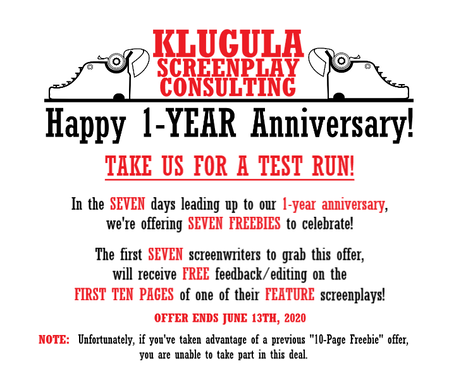 We're just 1 week away from our 1-year anniversary! And because we want you to celebrate with us, you're invited to take advantage of this freebie offer! Consider it a "test run", as we take a look at the first TEN PAGES of one of your FEATURE screenplays. So for the next SEVEN days, SEVEN screenwriters can join in the fun! And on Saturday, June 13th, 2020, the offer ends! Please note: If you've taken advantage of a previous "10-page freebie" offer, you'll be unable to take part in this particular deal. This offer applies to feature screenplays ONLY. Notes will be provided within 10 days of receipt of your pages.
1 Comment
 It's an old saying, and perhaps a cliche one... "Follow your gut", or "trust your gut". I find it interesting that the more you write, the more you can do just that. I can recall early on in my screenwriting, when I'd hem and haw about this or that - taking considerable time (and energy) to make sure that a character name was just right, right off the bat. To get a line of dialogue perfect the first time. Obviously, subsequent drafts (beyond that original vomit draft) will fix a lot of the problems and hopefully confirm (or deny) choices already put to paper. But as I continue in this writing journey, I find myself - multiple times a day - making a swift judgment call and simply moving on. It can be in a piece of description, a decision on whether a line of dialogue should begin with "Well...". So many little things (not inconsequential, mind you) that, once upon a time, I'd have lingered on and frankly, wasted valuable time. I hate to sound like an ass, but some of these things now feel like second nature to me. An instinct. And that's a good thing. Sure, I have plenty of moments where I'll pause and hash something out - perhaps because it requires such intense thought. Does this character die? If so, how does it have an effect on the lead character? Things like that do need some time to simmer... It's also interesting to note that during face-to-face feedback with my own beloved script editor/story consultant, we'll whip around ideas on an already 3-drafts in script. And when certain suggestions come up, it takes but a look up to the muse in the sky and a moment of thought before arriving at an almost immediate "yes" or "no". That's a moment of trusting your gut, thoroughly knowing your story and your characters, and realizing immediately that it will or won't work. And it wastes no time. Things that require further discussion, by all means, get in there and dig for a conclusion. I'd love to see the statistics on my own writing, about how many times these now-so-common "split-second" writing decisions, ended up staying exactly the same when eventually clicking "save" on that final draft. The point I'm making, is that if something comes to you quickly and it feels right - do it. Get it down on paper. Follow your gut. I mean, it can always be changed later, right? (not that you'll need to if you follow your gut). 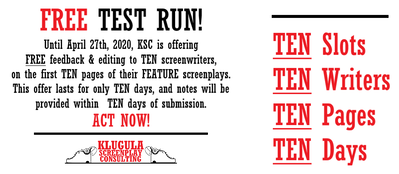 Are you looking to take Klugula Screenplay Consulting for a little test run? Perhaps a bit of a taste test? Well, for the next TEN days, I'm opening up TEN slots for TEN interested screenwriters. Send me the first TEN pages of your latest FEATURE screenplay and I'll offer FREE feedback/notes/editing and have said feedback to you within TEN days from the date of your submission. But there are only TEN slots available, and it's first come, first served. FREE! FREE! FREE! In TEN days (end of the day on 04.27.20), even if all of the slots don't get filled, this offer will end. NOTE: No short scripts. No prose. No teleplays. No stage plays. Feature scripts only. 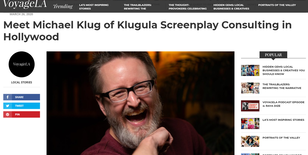 How cool is this? Check out this profile of yours truly and of Klugula Screenplay Consulting, by the good folks of Voyage LA. Spread the word! :)  I knew a girl in high school by the name of Shannon. We weren't necessarily friends, but knew of one another's existence (at least I knew who she was, can't speak for her). And I had a boss for several years while working in Beverly Hills, also named Shannon. But this tradition (to be discussed below) all started up long before I met Beverly Hills Shannon. Beginning with my very first screenplay, a zombie spec called, Sid's Apple, I've tried to have a character in each of my pieces, with the name "Shannon". It didn't start out as a "thing", it just naturally progressed. You see -- in Sid's Apple, Shannon was a nosy neighbor of my lead character, Sid. Thing is, she was also a zombie. So, an undead nosy neighbor. And my second script (another zombie tale), Me & Simon Baker -- well, I needed a neighbor of my main character to turn into a zombie, and I thought, "Wouldn't that be a hoot? To have this character be basically the same person? Aren't I clever?" Those original instances were at least organic, and now it's sorta stuck with me and become a tradition. Shannon -- never again the same character as those original zombie neighbors -- but she (haven't had a dude yet) still shows up, in name only. I just thought it'd be a fun exercise to call out her many memorable appearances. Sid's Apple: An undead and annoying neighbor. Me & Simon Baker: A soon to be undead and annoying neighbor. A. Family Portrait: A precocious 8-year old girl. Silver Spoon: The nerdy and heroic girlfriend of almost-hero and super-fan Roach. Furnish: An assistant manager in an upscale, Beverly Hills furniture store. Spider Eaters: An Australian cattle dog. The Costume People: A no-nonsense theatre stage manager. Mom Died: A funeral home director. Trip: A waitress at a down-home burger place. Also, in one of my first novels (currently in the works), a secondary character was christened "Shannon". Thought I'd share. Do you all have any habits or traditions you follow in your writing? And I'll just close with this: LONG LIVE SHANNON! 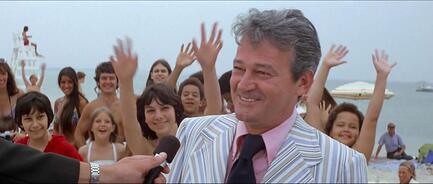 Murray Hamilton portrayed Mayor Vaughn in two films of the Jaws franchise. And when Quint (Robert Shaw) shows up to a town hall meeting, to offer his unique fishing abilities to the desperate townsfolk of Amity, Vaughn replies with a tepid, "We'll take it under advisement." As mentioned in a previous post, I've been reading/studying The Hollywood Standard. And, as mentioned before, there are some formatting and content rules mentioned in the book, with which I don't wholeheartedly agree. Certainly, there are absolute must-follow tricks, but some -- well, I believe they can be fudged, just a little bit, to suit my personal preferences. But as I work on a rewrite of one of my scripts (being co-penned with my friend Motown Maurice), I have discovered what might end up being a never-before-used, but now will be in constant rotation, trick from The Hollywood Standard. In the parenthetical piece of the screenplay document, I've always reserved that space for when a character is addressing a specific other character, and that needs to be clear. For instance: BOB (to Shirley). Bob is addressing a line to Shirley, rather than Doris, who is also in the scene. And if a character is yelling, or pauses or if a line MUST be read with a particular inflection. For instance: BOB (sarcastically). Meaning, Bob's line of dialogue could be delivered "regularly", but in this case, it's gotta be sarcastic. Many times, such bits of information are unnecessary, as the tone may be present in the context of the scene. But if it's not... But based on one of the lessons learned in "The Hollywood Standard", I now know how to use the parenthetical for another purpose, and it is something which will cut back on total line/page count. (I'm always a big fan of cutting back on page count!) Per the book, you CAN put the tiniest bit of action/description in the parenthetical. So instead of writing a separate action/description line of "Bob turns to Shirley, before speaking", you can put something like this: BOB I don't know for certain. (turns to Shirley) But I think I love you. If it's the speaking character's movement (not someone or something else), this is acceptable. And while yes, the parenthetical takes up another line, it's not THREE lines (the action/description and two spaces -- above and below). Every day, I try to better myself in the craft, and little things like this, which I was either against (because of prior knowledge or coaching), or was completely unaware of -- keep me learning and only serve to improve my work. So while I am not taking EVERYTHING from The Hollywood Standard as the end-all, be-all law of the land, there are certainly some lessons offered up in the book, which will be "taken under advisement" and perhaps adopted for all future scripts. There's an episode of American Dad, where Roger the alien sells off his dive bar (the one he operates out of the Smith home's attic). And he eventually becomes part of the business franchise, as its pitch-man, repeating the catch-phrase "Dive on in!", in a heavy Australian accent.
I was reminded of this when I was working on one of my latest feature specs. I had the initial inspiration - an idea, some characters, but not really any deep understanding of what the story or the plot might be. But that didn't stop me. Certainly, each writer has their own way of working, and over the years, it's become clear to me that I won't generally wait for a fully-realized concept before getting in there and digging for some goodies. It could be an image, a line of dialogue or a skeletal character idea, and I'll take it and run with it. Such is the case on my script "Trip". I'm already 39 pages into a first draft, and I don't quite know where it's headed. But I'm sure having fun figuring that out. Writing scenes, I'm beginning to understand the characters, their histories and trajectories. And eventually, these discoveries will lead me in the direction necessary, to formulate a plot and an all-encompassing story. Structure. I've said this in pitch meetings and to friends. "I let the characters tell me where they're gonna go and what they're gonna do." And yes, that sounds very "writerly" and a somewhat douchy thing to say, but I've found it to be accurate. Once you "get" your characters, things will naturally begin to materialize in your story. So to go back to this entry's title and inspiration (thanks American Dad), I've always found it more fun to simply "dive on in" with any tiny nugget of an idea or exciting image which your imagination throws at you. I mean, if it doesn't pan out into a fully realized story or script, you were still writing, right? Chalk it up to "writing exercises". And perhaps these scratchings can be used in later projects. And if you are more a planner, I salute you. Goodness knows my way of writing (train of thought process) makes for additional structural work down the road, since it was never mapped out properly in the beginning. But that's how I get my writing ya-yas and indeed, it's my process. [Side note: I've done treatments for several projects, so I know that a process of "planning" is still in my wheelhouse, but those were "for hire" gigs. When working for myself, letting the fates decide is always preferable.] I also will point out that some of my most brilliant (in my mind, of course) discoveries were found by just getting into a scene and doing it - with no idea of where it was going. I implore you to try this type of writing if you don't already. I find it freeing to "dive on in" and see where the day, the characters and your unstructured, uninhibited imagination might take you. Someone said something about it being a new year AND a new decade? And that this new year is 2020? Perhaps you've heard whispers of such things. Well, anyway, to celebrate those nice, round numbers, we're offering 20% off EVERYTHING SITEWIDE! Working on a feature screenplay, a short screenplay or want some help with some good ol' fashioned brainstorming to get your gears moving? Take advantage now, as the sale will only last until January 15th, 2020! (There are those numbers again, hmmm...)
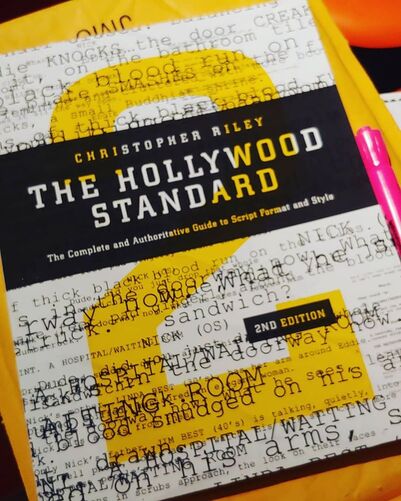 "The Hollywood Standard" was an early Christmas gift from my other half. Ever since my personal script editor/story consultant (the amazing Jonna Jackson) told me she was a convert to Mr. Riley's ways (using the lessons of his books while editing my screenplays), I have coveted a copy. So here's a review of sorts, and a few things which have now been brought to my attention. (Just an FYI, I found a few typos in the book - about proper formatting, and with a section on typos). It's a quick read, and I'm not trying to sound cocky by saying this, but I would venture a guess that I am pretty firm on about 80% of the lessons provided here. There is plenty of information on television script formatting, production script formatting, so I basically glossed over those, as they don't apply to my usual spec script writing. Obviously, should the time come for me to tackle a television program, I'll refer back to those particular chapters/sections. I plan to go back through the book again, more slowly, highlighting sections and particular notes, putting post-its here and there, and focusing on the items which I know will be of use to me as I move into my next screenplays. There are some things which I don't agree with -- namely the overuse of camera directions in descriptions or scene headings. I've never agreed with this, and while Mr. Riley suggests using such things infrequently, doing the director's job has never appealed to me, in my own screenwriting. Smaller things will also not be adopted. When I move the action from an Exterior scene, directly into an Interior scene (as an example), I will put CONTINUOUS, while Mr. Riley says it should be termed CONTINUOUS ACTION. A small difference to be sure, but I'll stick w/ my usual ways. I have been educated on many punctuation faux pas, and will certainly work to incorporate these new lessons into my writing from here on out. And there are a few other, minute formatting changes I'll make in areas outside of punctuation. I am also going to take to heart the fact that Mr. Riley gives the "thumbs up" for having small direction/action bits within the parenthetical (between the character name and character dialogue). Something I never would have done before, may now save some space on the page. But overall, after having read the book, it gives me a modicum of pleasure to see that as I've developed my own screenwriting tricks and traditions, that the vast majority of the lessons laid out in this book -- well, that I'm already in on those particular secrets. :) Again, not to sound cocky, but to acknowledge that I am (and have been) on the right track as far as proper screenplay formatting -- definite relief! Can I get a "whew!"? And this new nit-picky knowledge will also benefit you -- my potential clients!  For a limited time only! EVERYTHING on the site is 20% off! It's officially 2 months since KSC's launch, and so you'll get the anniversary gifts! Need some help on your feature or short screenplay, or wanna do some good old-fashioned brainstorming? Now's the time. HURRY! This milestone deal ends at midnight PST on August 20th, 2019! So let's get to work! |
newsStay up to date with screenwriting tips, sales on services, schedule changes and other important stuff at KSC! Archives
July 2024
Categories |



 RSS Feed
RSS Feed